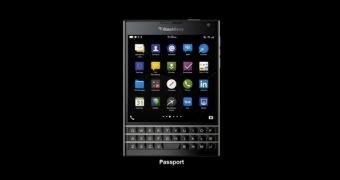There appears to be little room to strive in a smartphone market dominated by Android and iOS, but Canadian mobile phone maker BlackBerry might have finally found a winning recipe, after a few years of free downfall.
Earlier this week, the vendor has announced its financial results for the first quarter of its financial year 2015 and posted small profits, albeit it managed to sell only around 2.5 million smartphones in the three months ending May 31, 2014.
Compared to the big losses the company has been reporting over the past several quarters, the new financial report seems encouraging for the company, especially since it has been losing big market share ever since before the release of its first BlackBerry 10 handsets.
However, it seems that the market performance of these mobile phones is improving, and all signs point to great recovery in the months ahead, influenced by the most popular mobile operating system out there, Android.
While this might seem rather redundant, things are actually quite simple, especially if we have a look at another announcement that BlackBerry has made this week: starting with the next flavor of its mobile OS, namely BlackBerry 10.3, the Amazon App Store will be available for its users.
What this means for the Canadian vendor is that owners of BlackBerry handsets will receive access to over 240,000 Android applications straight on their smartphones, all in one shot.
BlackBerry has officially partnered with Amazon for this move and has also announced that they will be working together with the BlackBerry application developer community to help app builders migrate their software to the Amazon App Store.
This partnership should prove beneficial for all involved parties, including BlackBerry app developers, who will enjoy tools such as Appstore Developer Select, Amazon Coins incentives, Developer Promotions Console, and the Free App of the Day program.
For users, this will translate into access to a great deal of new applications on their devices, such as Groupon, Netflix, Pinterest, and Candy Crush Saga, as well as into easier access to all these.
BlackBerry 10 has had support for Android applications for some time now, though it wasn’t that simple for users to download and install software. The new partnership makes things pretty straightforward, though users will still have to wait for BlackBerry 10.3 to arrive later this year.
Whether the Amazon partnership will result in the death of BlackBerry World, it remains to be seen. Most probably, the Canadian vendor will keep the service alive, though it might want to consider a redesign for it, so as to make it more user-friendly.
The bottom line here is that BlackBerry is currently working on ensuring a strong app ecosystem for its smartphones, something that should help its recovery. After all, it has been already proven that the success of mobile platforms today is conditioned by the number of applications available for them.
However, apps alone won’t help the company regain its foothold and make its BlackBerry OS a successful platform once again. For that, it will also need great handsets, as today’s smartphone users are equally interested in the specs, performance and looks of their devices.
With the previous BlackBerry 10 phones, the Canadian vendor made the first steps in this direction, packing them with hardware capabilities in line with those inside devices running under other mobile platforms out there.
Moving forth, the vendor is expected to launch even more powerful handsets, including the Passport, which will boast a 4.5-inch touchscreen display capable of delivering a 1440 x 1440 pixels resolution and a QWERTY keyboard.
A BlackBerry Classic device will also arrive on shelves sometime in November, resembling the Bold 9900, but with a 3.5-inch and built using premium materials that will ensure reliability and durability. The traditional trackpad and BlackBerry navigation keys (menu, back, send, end) will also be present on the phone.The smartphone maker appears to be aiming mainly at BlackBerry enthusiasts with these two phones, but its strategy might actually pan out in the end. After all, due to popular demand, it did make the BlackBerry Bold 9900 handset available once again only a few weeks ago.
While these two devices won’t be enough to secure BlackBerry success once again, other handsets will also arrive to help it in its quest.
The recently released BlackBerry Z3 has proved highly successful in Indonesia, and it is about to go official in India too, where it might be able to attract a lot of users to its side as well.
With entry-level smartphones currently winning battles for mobile platforms around the world, BlackBerry Z3, along with other similar devices, could do the same for the Canadian vendor, that’s for sure.
In fact, I believe that the company should heavily focus on the release of more affordable handsets, and not necessarily entry-level ones. Powerful smartphones that are priced just right will certainly allow it to regain customer trust and make a powerful comeback.
Additionally, there’s also the rumored BlackBerry phablet that CEO John Chen supposedly confirmed in an interview only a few weeks back. Should it indeed arrive on shelves this year, it would round up the company’s lineup nicely, with devices at all price points.
Aside from apps and hardware, there’s also a refreshed BlackBerry 10 OS version coming before the end of this year, in the form of the aforementioned BlackBerry 10.3, which was actually officially confirmed last month.
The new OS iteration will arrive with a redesigned home screen, fast access to Quick Settings, more app icons on the screen, an updated BlackBerry Hub, a redesigned Calendar, refreshed camera UI, and a great deal of other enhancements as well.
On top of all that, there’s also the matter of services, including BBM, BlackBerry Enterprise, and others, which are still highly appreciated all around the world and which keep the Canadian mobile phone maker in the game.
These services might not be as strong as they used to be only several years ago, but their leadership is incontestable, especially in the enterprise segment. They are yet another thing that BlackBerry can still bet on, that’s for sure.
So, there you have it. In my opinion, for a brand that seemed to be heading straight to the graveyard only about half a year ago, BlackBerry seems to be standing rather strong right now, ready for rebound.
With help from its user base, renewed carrier partnerships, and an expanded software ecosystem, which will go along nicely with new hardware and an improved OS, the company might actually be capable of proving that it’s here to stay for a while longer.
It might seem a bit difficult to believe, but others have already done it, including Microsoft with its Windows Phone OS, which became the third largest mobile OS at the beginning of this year.

 14 DAY TRIAL //
14 DAY TRIAL // 

